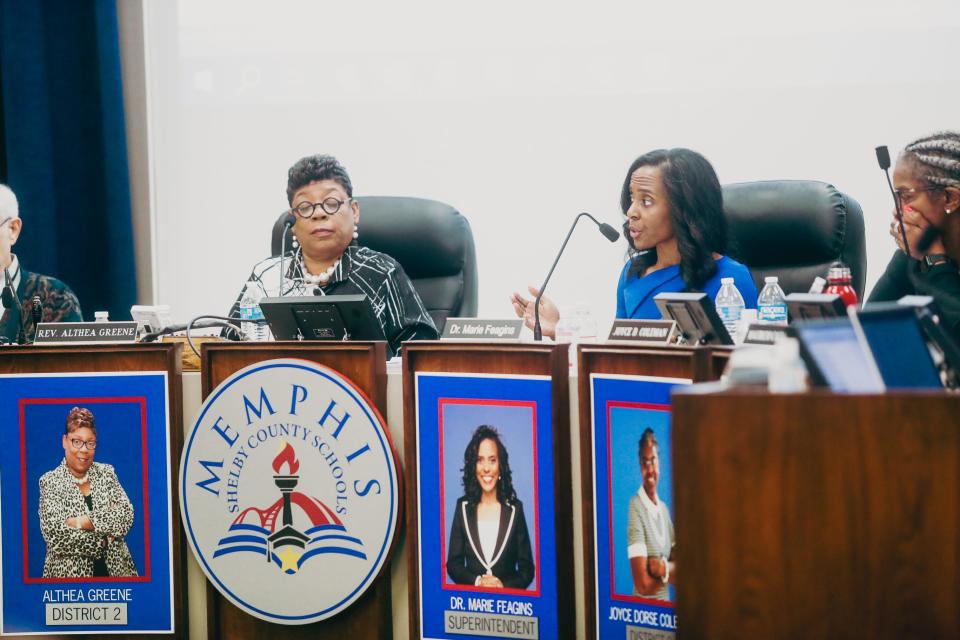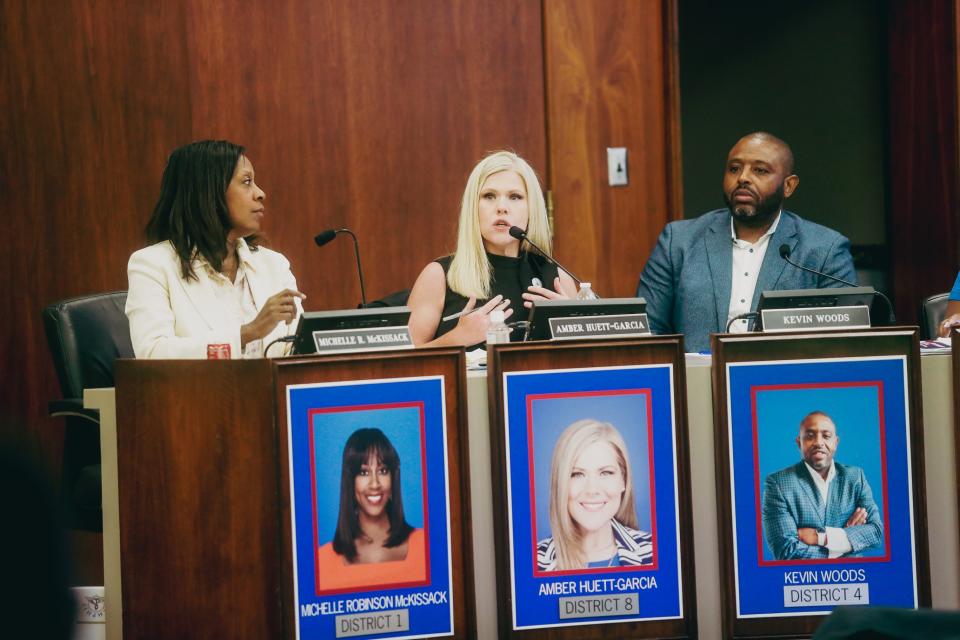MSCS board pauses superintendent's plans for 1,100 job cuts, expresses frustration
On June 10, Memphis-Shelby County Schools superintendent Marie Feagins sent out an email to all district staffers, detailing plans to eliminate 1,100 positions in the proposed Fiscal Year 2025 budget. More than 400 of those positions are vacant, and people affected by the cuts are being offered alternate positions within the district closer to classrooms, to better support schools.
Feagins has maintained that the effort will bring desperately needed resources to classrooms and fill key vacancies in schools, alleviate financial challenges the district is facing, and give people the option to remain employed with MSCS in other roles — instead of just laying them off.
But some of the alternate positions being offered are coming with drastic salary reductions. And the way the personnel changes have been communicated has frustrated not just employees, but MSCS board members — who felt they weren’t adequately informed of Feagins’ plans.

They hadn’t known the email was being sent out on Monday; and during a special-called meeting on Tuesday evening, the MSCS board members passed a resolution asking Feagins to pause any additional staff reductions until she shares a detailed personnel plan with the board and the board approves the proposed FY 2025 budget.
Here’s why the board passed the resolution, why Feagins still insists the job cuts are the right way to go, and how employees are feeling.
'Our ask'
The resolution asking Feagins to pause the implementation of staff reductions passed 8-1, with board member Mauricio Calvo the sole “no” vote.
But why did the board so emphatically choose to pause the plan of a person they unanimously voted to make superintendent on Feb. 9? Much of it had to do with communication.
There was a central theme expressed from board members during the special-called meeting — they felt like Feagins hadn’t kept them in the loop about what she and her team were doing, given the enormity of the personnel changes and the impacts they could have on employees.
“When I look out there, I just want to cry, when I think about people's salaries being cut at $90,000, $80,000, $40,000, $30,000,” said board chair Althea Greene, who introduced the resolution, during the meeting. “We're not saying we don't want change. What we are saying is, ‘Show us what the change is going to do. How will saving this money impact the academic performance of this district and our students?’ Our ask is just to be brought along on this journey.”
Added board member Mauricio Calvo: “You’re such a strong communicator, except this time… Nobody in this room, on this body [the board] felt like we were in full communication. So, either you’re all crazy, or you didn’t communicate well.”

It also wasn’t just that board members felt Feagins hadn’t fully communicated with them, either. They were also frustrated by how the process has played with employees.
“The communication caused panic, chaos,” said board member Amber Huett-Garcia. “And when you mess with someone's livelihood, that is traumatic. And I got nothing short of alarm with a district-wide email. So that was not done well.”
Board member Kevin Woods shared a similar sentiment.
“We can make tough decisions and stand up for them. But it's OK to inform them early and inform them often. We can do that,” he said. “You cannot build a great culture, if people don't hear from you directly and clearly.”
That’s not to say, however, that board members don’t support Feagins’ proposal to cut 1,100 jobs. The resolution doesn’t prevent the personnel changes from being implemented — it merely stops the district from acting on any more of them until the board has more information. Per state law, MSCS will still be notifying the state of the proposed layoffs, even before the board rescinds the resolution and gives Feagins and her team the greenlight to move forward.
And during the meeting, board members acknowledged that many of the changes she was proposing were necessary, and commended Feagins for taking action. They stand by her as superintendent, and the resolution might not alter her plan at all.

“There are aspects of this resolution I absolutely understand and respect and agree with, but also focus on the fact that I want to focus on what's best for children,” said board member Michelle McKissack, during the meeting. “And I hate the fact that some [employees] are going to be negatively impacted, but that happens in every industry on the face of the earth when change is needed.”
Budget constraints
But why do MSCS officials believe change is needed?
It stems, in part, from the slew of challenges the district is facing. In the 2022-23 academic year, 78% of the district’s students weren’t scoring proficiently on the English Language Arts (ELA) section of the Tennessee Comprehensive Assessment Program (TCAP) tests. Another 83% weren’t scoring proficiently on the math section. The dropout rate was nearly 15%, the truancy rate was 41%, and there were 1,069 total position vacancies — 552 teacher vacancies and 517 support post vacancies.
Schools, Feagins has asserted, desperately need more resources, and the district budget isn’t unlimited. It has to find more money and people to push into the schools somewhere, and she believes the 1,100 job cuts and corresponding offers to affected employees could be the solution.

At first glance, the proposed $1.8 billion budget seems massive — especially when you consider the additional $23 million MSCS is getting from the State of Tennessee in the upcoming year.
But that $23 million, MSCS CFO Tito Langston pointed out during the meeting, is counteracted quickly when you consider the $28.4 million the district recently injected into teacher salaries, to bring their starting pay to $50,000.
And the district has no shortage of major expenses. More than $500 million of its annual budget, Langston explained, immediately goes to schools. Another $254 million is passed on to charter schools. The district is set to spend $96 million for the first phase of its plan to combat at least $1 billion in deferred maintenance, and the costs for the two new high schools it plans to build have ballooned.
There are also many positions in the schools that the district wants to keep that it paid for with Elementary and Secondary School Emergency Relief (ESSER) Fund that was implemented during the COVID-19 pandemic. It hired, for example, 750 special education assistants (SEAs), and 77 reset room assistants to help students calm down.
These positions appeared to have a positive impact, but ESSER funding is drying up — which means MSCS must now pay for these employees in other ways. The district must also increase pay for craftsmen — think electricians and plumbers — and nutrition staffers, to keep them from leaving for better-paying positions elsewhere.

Needless to say, there’s a lot of expenses the district has; and Feagins believes the proposed personnel changes are an effective way to bolster district prospects and get more resources into the schools. The proposal also isn’t new. MSCS had discussed job cuts and position shifts back in November, months before Feagins was hired. And she has said personnel changes were coming since stepping into the role in April.
She also alluded to the possibility during her final interview with MSCS in early February.
And on Tuesday evening, she defended her plan and emphasized the importance of it.
“When I arrived, I said, ‘Next is now; and so, to get to the ‘next,’ it is solely dependent on what we do now. And now it's urgent. Yesterday it was urgent,” she said during the meeting. “I am taking this with pride to bring before you the hardest decisions that have not been made in previous years for me.”
'Time to understand'

Her words haven’t necessarily swayed employees poised to be affected by the plan, and multiple staffers expressed frustration with Feagins and the job cuts during the public comment portion of the meeting.
Barbara Beloch, a parent liaison who has been with the district for 18 years, asserted that she and other parent liaisons have become family engagement specialists, and that their salaries have been cut in half.
Jarvis Cook, an MSCS HR staffer, maintained that Feagins wasn’t valuing the hard work of central office staffers.
“Although we may not be in the classroom, our work is equally important. Every individual within our organization from educators to support staff play a crucial part in the success of our students and the district as a whole,” he said. I am not an adversary to change, but I do know you can’t change what you have not taken the time to understand.”
Not all employees, however, were upset with Feagins. And multiple teachers praised her for the decisions she has made and emphasized that they will benefit students by bringing more people and resources into the classroom.
“If we’re going to save this city… we must save our children,” said Liz Marable, an MSCS teacher, during the public comment period. “I’m here to thank you for taking on this task… It is commonly said that you cannot fix a problem until you admit there is one. I appreciate you, Dr. Feagins, and the Board of Education for stating publicly where we are — and how we need to move to where we want to be.”
John Klyce covers education and children's issues for The Commercial Appeal. You can reach him at [email protected].
This article originally appeared on Memphis Commercial Appeal: MSCS board pauses district plans for job cuts, expresses frustration
